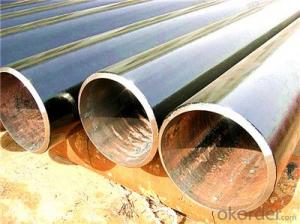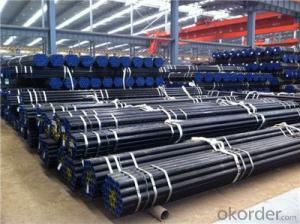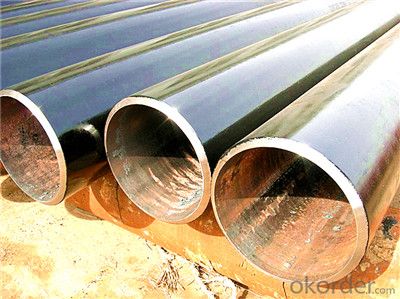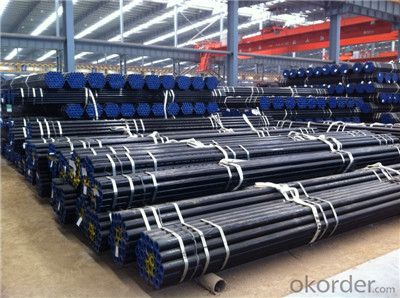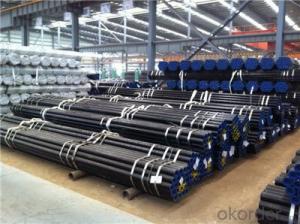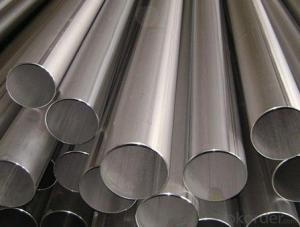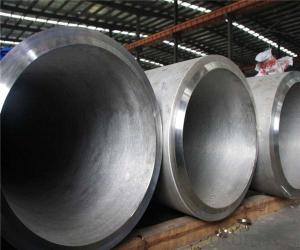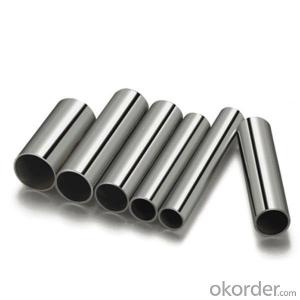CNBM seamless steel tubes hot selling with high quality
- Loading Port:
- Tianjin
- Payment Terms:
- TT OR LC
- Min Order Qty:
- 50 m
- Supply Capability:
- 200000 m/month
OKorder Service Pledge
OKorder Financial Service
You Might Also Like
PRODUCT DETAILS
1.Structure of Seamless Steel Pipe Description:
A large amount of Seamless Steel Pipes is offered to the clients at cost effective rates. These pipes are extremely durable, resistant to corrosion and have high tensile strength. Our pipes are used in nuclear plants, power plants, refineries and construction industry across the country. Furthermore, we are capable of providing these seamless pipes to the clients in bulk quantity.
2.Main Features of the Steel Pipe:
• High manufacturing accuracy
• High strength
• Small inertia resistance
• Strong heat dissipation ability
• Good visual effect
•Reasonable price
3.Packaging & Delivery:
| Packaging Details: | Seaworthy packages, bundles wrapped with strong steel strip |
| Delivery Detail: | 15-30 days after received 30% TT |
4.Seamless Steel Pipe Specification:
| Standard: | GB, DIN, ASTM,ASME, ASTM A106-2006, ASTM A53-2007 |
| Grade: | 10#,20#, 45#, 16Mn |
Thickness: | 8 - 33 mm |
| Section Shape: | Round |
| Outer Diameter: | 133 - 219 mm |
| Place of Origin: | Shandong, China (Mainland) |
| Secondary Or Not: | Non-secondary |
| Application: | Hydraulic Pipe |
| Technique: | Cold Drawn |
| Certification: | API |
| Surface Treatment: | factory state or painted black |
| Special Pipe: | API Pipe |
| Alloy Or Not: | Non-alloy |
| Length: | 5-12M |
| Outer Diameter: | 21.3-610mm |
5.Product pictures
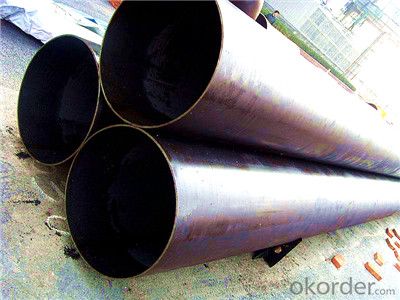
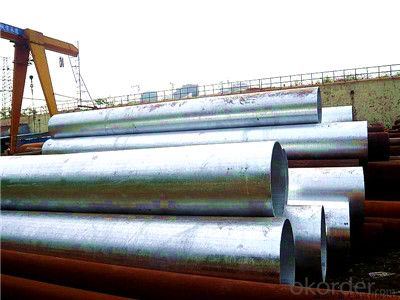
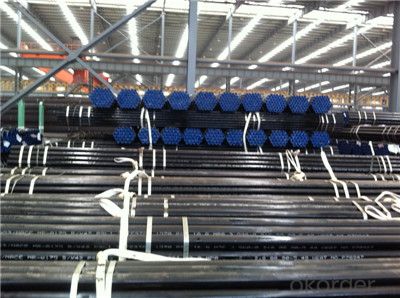
6.FAQ of Seamless steel pipe:
①How is the quality of your products?
Our products are manufactured strictly according to national and internaional standard, and we take a test
on every pipe before delivered out. If you want see our quality certifications and all kinds of testing report, please just ask us for it.
Guaranteed: If products’ quality don’t accord to discription as we give or the promise before you place order, we promise 100% refund.
②How about price?
Yes, we are factory and be able to give you lowest price below market one, and we have a policy that “ for saving time and absolutely honest business attitude, we quote as lowest as possible for any customer, and discount can be given according to quantity”,if you like bargain and factory price is not low enough as you think, just don’t waste your time.Please trust the quotation we would give you, it is professional one.
③Why should you chose us?
Chose happens because of quality, then price, We can give you both.Additionally, we can also offer professional products inquiry, products knowledge train(for agents), smooth goods delivery, exellent customer solution proposals.Our service formula: good quality+good price+good service=customer’s trust.
SGS test is available, customer inspection before shipping is welcome, third party inspection is no problem.
Any question, pls feel free to contact us !
- Q: What type of steel pipe dance is used in general?
- The steel pipe fittings used in the pipe dance are made of smooth surface material, usually chrome or polished by steel or iron.
- Q: Does the seamless steel pipe need rust removal?
- Spray (throw) shoot derusting by the high-power motor to drive the spray shot (impeller) blade rotating speed, the steel grit, steel shot, iron wire, minerals and other abrasive jet for 20# seamless steel tube surface under the action of centrifugal force (left) radiation treatment, not only can completely remove the dirt and rust, oxide, and the role of 20# seamless steel in abrasive blast and friction force, can achieve the required uniform roughness.Not only can the physical adsorption effect on the surface of the pipe be increased, but also the mechanical adhesion of the anticorrosive layer to the pipe surface can be enhanced. Therefore, spraying (throwing) shot derusting is an ideal method of rust prevention for pipeline corrosion protection. Generally speaking, shot peening (sand) derusting is mainly used in the inner surface treatment of tubes, shot blasting (sand) derusting is mainly used for the outer surface treatment of tubes.
- Q: What are the different types of steel pipe connections?
- There are several types of steel pipe connections, including threaded connections, welded connections, flanged connections, and grooved connections.
- Q: How do steel pipes handle water erosion?
- Steel pipes are highly resistant to water erosion due to their robust and durable nature. The smooth surface of steel pipes minimizes the formation of rust and corrosion, preventing water erosion from occurring. Additionally, steel pipes can withstand high water pressure and turbulent flow, further enhancing their ability to handle water erosion effectively.
- Q: What is the difference between internal coating and external lining of steel pipes?
- Steel pipes can be protected from corrosion and damage through two different methods: internal coating and external lining. When it comes to internal coating, a protective layer or coating is applied to the inner surface of the steel pipe. This is done to prevent corrosion or damage caused by the fluid or substance being transported through the pipe. Common materials used for the coating include epoxy, polyurethane, or polyethylene. These materials create a barrier between the pipe and the transported material, thus extending the pipe's lifespan and preserving the quality of the transported material. On the other hand, external lining involves applying a protective layer or lining to the outer surface of the steel pipe. The purpose of this is to shield the pipe from external elements like soil, moisture, chemicals, and physical damage. Materials such as polyethylene, polypropylene, or fusion-bonded epoxy are typically used for the external lining. By acting as a barrier, the lining prevents corrosive substances from coming into contact with the pipe and causing harm. Additionally, it helps maintain the pipe's structural integrity and prevents the formation of leaks or cracks. To summarize, the main distinction between internal coating and external lining of steel pipes lies in where the protective layer is applied. Internal coating focuses on the inner surface of the pipe, while external lining concentrates on the outer surface. While both methods aim to safeguard the pipe from corrosion and damage, they address different aspects of pipe protection.
- Q: What is the minimum wall thickness for steel pipes?
- The minimum wall thickness of steel pipes varies depending on different factors, including the pipe's intended use and the specific industry standards and regulations. Determining the minimum wall thickness generally involves considering factors like the pipe's diameter, material strength, and the pressure or load it will experience during operation. In the oil and gas industry, for instance, the minimum wall thickness for steel pipes is typically specified by industry standards such as API 5L or ASME B31.3. These standards take into account elements such as the pipe's diameter, the material's yield strength, and the maximum pressure it will encounter. In other applications, such as structural or mechanical engineering, the minimum wall thickness for steel pipes is determined by factors like the pipe's intended load-bearing capacity, the desired safety factor, and any relevant building codes or regulations. To establish the specific minimum wall thickness requirements for steel pipes in a particular application, it is essential to consult the appropriate industry standards, codes, or regulations.
- Q: How do steel pipes handle ground freezing and thawing?
- Steel pipes are highly resistant to ground freezing and thawing due to their inherent strength and durability. They are designed to withstand extreme temperature variations without significant damage or deformation. Additionally, steel pipes have low thermal conductivity, meaning they do not transfer heat as easily as other materials, allowing them to maintain their structural integrity even in freezing conditions. Thus, steel pipes are an excellent choice for underground infrastructure and can effectively handle ground freezing and thawing.
- Q: What are the different types of steel pipe connections for steam pipelines?
- There are several types of steel pipe connections commonly used for steam pipelines. These include threaded connections, flanged connections, welded connections, and grooved connections. Each type has its own advantages and is chosen based on factors such as the pipe size, pressure, and temperature requirements, as well as the ease of installation and maintenance.
- Q: Where is the difference between seamless steel pipe and welded pipe?
- Seamless pipe pressure is higher, welded pipe is generally in 10 or so MPa, now welded pipe to do seamless processing.
- Q: What are the different methods of lining steel pipes?
- There exist various techniques for lining steel pipes, each possessing distinct advantages and applications. Some popular methods comprise: 1. Cement Mortar Lining: This technique entails the application of a cement mortar layer onto the inner surface of the steel pipe. Cement mortar offers outstanding protection against corrosion and grants smoothness to the pipe, consequently diminishing friction and enhancing flow rates. It finds common usage in water supply systems and sewage treatment plants. 2. Polyethylene (PE) Lining: PE lining necessitates the insertion of a polyethylene tube into the steel pipe. Typically, the tube is heat fused or mechanically connected to the steel pipe, resulting in a seamless and corrosion-resistant lining. PE lining is commonly employed in gas transmission and distribution pipelines. 3. Epoxy Lining: Epoxy lining involves the application of an epoxy resin onto the inner surface of the steel pipe. Epoxy coatings exhibit exceptional resistance to corrosion, abrasion, and chemicals, thereby making them suitable for a variety of applications such as oil and gas pipelines, water treatment, and industrial processes. 4. Trenchless Pipe Lining: This method serves to rehabilitate existing steel pipes without the requirement of excavation. It encompasses the insertion of a liner or resin-coated fabric into the existing pipe, which is subsequently inflated and cured to form a new lining. Trenchless pipe lining is commonly utilized for sewer and water main rehabilitation. 5. Polyurethane (PU) Lining: PU lining involves the spraying or pouring of a polyurethane coating onto the inner surface of the steel pipe. Polyurethane linings deliver excellent resistance to abrasion, impact, and chemicals, thereby suiting applications in mining, slurry pipelines, and wastewater treatment. These represent merely a few of the numerous methods accessible for lining steel pipes. The selection of a lining approach is contingent upon factors such as the intended application, the environment, and the desired level of corrosion resistance and durability.
Send your message to us
CNBM seamless steel tubes hot selling with high quality
- Loading Port:
- Tianjin
- Payment Terms:
- TT OR LC
- Min Order Qty:
- 50 m
- Supply Capability:
- 200000 m/month
OKorder Service Pledge
OKorder Financial Service
Similar products
Hot products
Hot Searches
Related keywords
